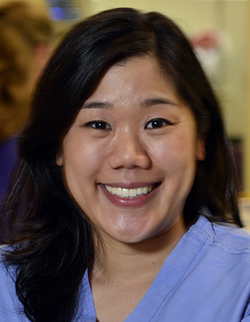

About Dr. Dong
Dr. Naomi Dong is a board certified anesthesiologist who completed her anesthesia residency at St. Lukes-Roosevelt Hospital Center in New York City. She served as Chief Resident during her final year of residency before completing a pediatric anesthesia fellowship at the Childrens Hospital of Philadelphia.
She joins Hospital for Special Surgery staff as an Attending Anesthesiologist with a special focus in pediatric regional anesthesia and acute pain management.
Departments
Patient Stories
Insurance
If your insurance is not listed, please call our office if you have questions regarding your insurance coverage. If you have out-of-network benefits, then your insurance may reimburse you for a portion of your office visit. We will work with you and your insurance to minimize your out-of-pocket costs. Financial assistance may be available for patients in need.
Credentials
Appointments
Attending Anesthesiologist, Hospital for Special Surgery
Clinical Assistant Professor of Anesthesiology, Weill Cornell Medical College
Affiliations
American Society of Anesthesiologists
Society for Pediatric Anesthesia
Certification
Basic Life Support (BLS)
Advanced Cardiac Life Support (ACLS)
Advanced Trauma Life Support (ATLS)
Pediatric Advance Life Support (PALS)
Pediatric Anesthesiology
Education
Medical: University of Virginia School of Medicine, Charlottesville, VA, 2006
Internship: Department of Internal Medicine, Virginia Commonwealth University School of Medicine, Richmond, VA, 2007
Residency: Department of Anesthesiology, St. Luke's-Roosevelt Hospital Center, New York, NY, 2010
Fellowship: Department of Pediatric Anesthesiology and Critical Care Medicine, The Children's Hospital of Philadelphia, Philadelphia, PA, 2011
State Licensure
Languages
English
Publications by Dr. Dong
Selected Journal Articles
For all publications, please see the PubMed listing.
Selected Presentations
“Early Detection of a Pressure Ulcer in a Patient with Continuous Femoral and Sciatic Nerve Blockade,” N. Dong, A. Ganesh, A. Quadeer, The Children’s Hospital of Philadelphia. To be presented at the Society for Pediatric Anesthesia Meeting, San Diego, CA, April 2011
“Difficult Airway Management in an Infant with Subglottic Stenosis,” N. Dong, F. Resta-Flarer, St. Luke’s-Roosevelt Hospital Center. Presented at American Society of Anesthesiologists Meeting, San Diego, CA, October 2010
“An Unexpected Laparoscopic Gastric Bypass Complication,” N. Dong, J. Castro, St. Luke’s-Roosevelt Hospital Center. Presented at American Society of Anesthesiologists Meeting, San Diego, CA, October 2010
“Anesthetic Challenge of PHACES Syndrome in an Infant during Laser Surgery,” N. Dong, V. Hrdlicka, St. Luke’s-Roosevelt Hospital Center. Presented at American Society of Anesthesiologists Meeting, New Orleans, LA, October 2009 and Society for Pediatric Anesthesia Meeting, Jacksonville, FL, March 2009
“Multidisciplinary Management of a Child with Recurrent Cystic Hygroma,” N. Dong, F. Resta-Flarer, V. Hrdlicka, St. Luke’s-Roosevelt Hospital Center. Presented at American Society of Anesthesiologists Annual Meeting, New Orleans, LA, October 2009
Research
Research Interests
Pediatric regional anesthesia and acute pain management
Industry Relationships
Industry Relationships
HSS has a long history of supporting appropriate relationships with industry because they advance HSS's mission to provide the highest quality patient care, improve patient mobility, and enhance the quality of life for all, and to advance the science of orthopedic surgery, rheumatology, and their related disciplines through research and education.
As of May 11, 2024, Dr. Dong reported no relationships with the healthcare industry.
HSS and its physicians make this information available to patients and the public, thus creating a transparent environment for those who are interested in this information. Further, the HSS Conflicts of Interest and Commitment Policy prohibits physicians from collecting royalties on products they develop that are used on patients at HSS.

